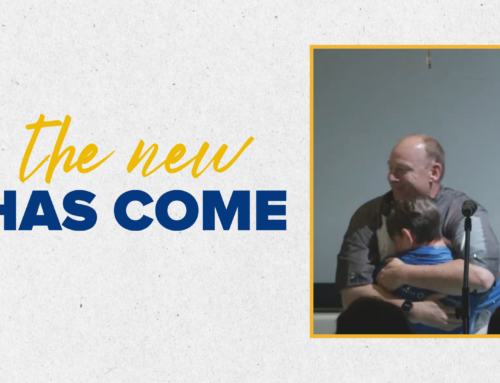By Tim Peace
We’ve been having fun with parables during our message series, Aha! Jesus’ Stories for Change, our Build: Seminars series on the parables, and our Small Group devotional study on the parables. It’s been Parable Central here at Mount Carmel!
To encourage you to continue in your personal and group study of the parables, I wanted to use a parable as a source of encouragement as you continue on in that endeavor.
The parable is found in Mark 2:18-22, Matthew 9:14-17, and Luke 5:33-39. But, for the sake of space, we’ll focus here on the version in the Gospel of Mark:
Now John’s disciples and the Pharisees were fasting; and people came and said to him, “Why do John’s disciples and the disciples of the Pharisees fast, but your disciples do not fast?” Jesus said to them, “The wedding guests cannot fast while the bridegroom is with them, can they? As long as they have the bridegroom with them, they cannot fast. The days will come when the bridegroom is taken away from them, and then they will fast on that day.
“No one sews a piece of unshrunk cloth on an old cloak; otherwise, the patch pulls away from it, the new from the old, and a worse tear is made. And no one puts new wine into old wineskins; otherwise, the wine will burst the skins, and the wine is lost, and so are the skins; but one puts new wine into fresh wineskins.” – Mark 2:18–22 NRSV
This particular parable has always fascinated me, primarily because it was one that I often struggled to grasp in my earlier study of the New Testament.
Jesus tells two parables to drive home a similar, if not singular, idea, as a part of his response to the people questioning Jesus about his disciples’ lack of fasting while the disciples of John the Baptist and those of the Pharisees were participating in the religious custom.
First, Jesus responds with a question of his own, “The wedding guests cannot fast while the bridegroom is with them, can they?” Then, Jesus, making a clear allusion to, first, his presence and, second, his forthcoming absence, explains that his disciples have no reason to fast because he is with them. His presence is cause for celebration, rather than fasting, much like the presence of the bridegroom at a wedding brought about celebration.
Jesus, being the way he is, doesn’t leave things with a simple retort. Instead, he pushes the questioners further with two parables, one about a patch on an old garment and one about new wine and old/new wineskins.
The patch in Jesus’ parable is a new piece of unshrunk cloth. Without getting too technical, this piece of cloth was actually preshrunk but, when washed, could still shrink more than it already had when made. Thus, when patched onto an old, worn garment, its consistency would not be the same as the old garment, causing more damage to the old garment when sewn together with it. Therefore, for Jesus, the preshrunk cloth should only be used for a new piece of clothing so that when it is worn and washed, it will last.
In the second parable, Jesus says that new wine should not go into old wineskins but into fresh wineskins. Why? Well, old wineskins would have become brittle and worn out over time, and each time they are filled up, the potential for the wineskin to burst is exacerbated. Therefore, to avoid wasting new wine, it belongs in new wineskins, sturdy and capable of holding in the new wine.
What Jesus has done here is he has moved from challenging assumptions about traditional religious practices and then gone further, questioning the openness and readiness of the people questioning his disciples. New material and new wine, alike, are best paired with something capable of holding together when they are supplied.
For us today, these two small parables from Jesus should compel us to remain open to understanding Jesus’ teachings with a fresh perspective and with humility, not assuming we’ve got it all figured out and living our faith journey in an assumptive daze. Because the truth is, if we live our lives like old garments or old wineskins when God works on us or pours into us, we’ll fall apart if we’re not open, available, and ready for the new things he intends to teach us. Or, at least, to the unique ways we are called to apply old precepts and principles.
Stay open to God’s word, and, rather than falling apart at hearing it and applying it, you’ll continue to thrive in bearing fruit.






Leave A Comment